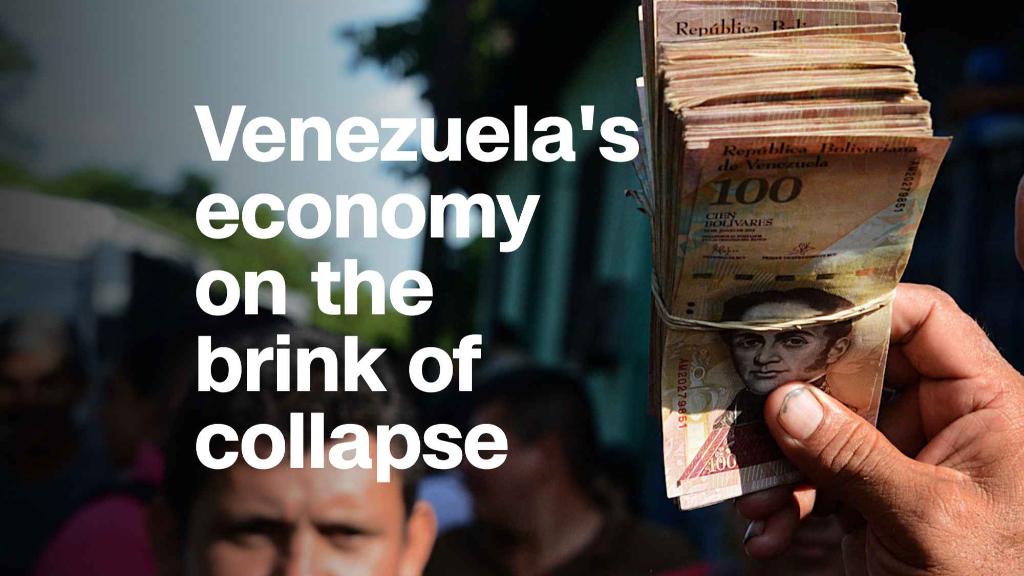
Colombia was once the rising economic star of Latin America. Now it has a long list of challenges — and the latest is an unprecedented refugee crisis.
Venezuelans are pouring in to flee the humanitarian disaster in their home country.
Colombia was already dealing with corruption scandals, record cocaine production, proposed cuts in American aid, oil headaches and a costly peace agreement to end a 50-year civil war.
Another blow came in December, when Standard & Poor's cut Colombia's credit rating to one level above junk status. And a presidential election is coming in May.
The Colombian economy grew just 1.8% last year, the slowest pace since the global financial crisis a decade ago. In 2011, it was booming at 6%.
"It's certainly not the star that it was four or five years ago," says Richard Francis, director of Latin America sovereign debt at Fitch Ratings.
'Numbers of people that would pose a challenge to any country'
Venezuelans are suffering under severe shortages of food and medicine, a worthless currency and a political regime that many governments, including that of the United States, consider a dictatorship.
Those crises are driving people into Colombia in huge numbers. More than half a million Venezuelans were living in Colombia last year, up 62% from the year before. Makeshift refugee camps are popping up in parking lots and parks in Colombia's largest border city, Cucuta.
Colombia is both a place to stay and a point of passage. The number of Venezuelans crossing into Colombia en route to somewhere else rose 600% last year, to 231,000.
President Juan Manuel Santos recently tightened border controls and ordered 3,000 more national guardsmen to the border.
On the Colombian side, "hospitals are overflowing," says Raul Gallegos, a Bogota-based associate director at the global consulting firm Control Risks. "You have Venezuelans living in parks because they can't find a place to live. This will only get worse, and it will have a financial impact for the Colombian government."
The United Nations High Commission for Refugees recently opened a third office along the Colombia-Venezuela border to complement the Colombian government's humanitarian efforts.
Josef Merkx, UNHCR's representative in Colombia, told CNN that Colombian officials and border communities are doing their best, but are "strained."
Latin America "is facing one of the largest population outflows in its history," Merkx said in an email. "Colombia had not been a host country to great numbers of migrants and refugees, and they are receiving numbers of people that would pose a challenge to any country."
Other simmering problems
The costly refugee crisis comes at a particularly tough time. Colombian leaders have imposed belt-tightening measures — higher taxes and cost-cutting at the state-run oil company — to reel in spending.
Like many nations, Colombia suffered mightily from a plunge in oil prices that started in late 2014. Oil is Colombia's top export, and the economy depends heavily on commodities for growth.
The oil downturn put Colombia in a hole, and it's still digging out. The country's mining, manufacturing and construction industries all shrank last year. That hasn't happened since at least 1999, government figures show.
It faces a complication that many other oil-rich nations don't: Colombians citizens are legally allowed to halt or prevent drilling, exploration and extraction projects because of environmental or health concerns.
As of December, there were 45 such petitions, according to a government agency. Experts say foreign companies are losing their appetite to drill there.
"It's easier to do business in Venezuela's oil sector than in Colombia's oil sector," Gallegos says. "Colombia can't afford to be a country where local communities block extraction activity."
Other problems have bogged down the economy. Santos' administration has been embroiled in a bribery scandal that has rocked Latin America. Experts say it has delayed or halted some public infrastructure projects.
Another longstanding problem: Cocaine. The U.S. State Department reported that cocaine production in 2016 in Colombia rose to an all-time high, and the Trump administration has proposed cutting aid to Colombia by 36%.
Implementing Colombia's peace agreement with the guerrilla rebel group known as FARC is one more financial burden. Humanitarian goals have been achieved: FARC rebels handed in weapons last year, ending a 50-year civil war. But integrating thousands of rebels and their captives into society is expensive. Santos raised taxes last year in part to pay for peace costs.
Despite challenges, 'Overall the Colombian economy is healthy'
Some economists say the challenges are mild in the big picture. Colombia hasn't had a recession since 1999. And despite the economic downturn, unemployment has remained around 9%.
Its problems are northing compared to the misery next door in Venezuela. It doesn't face as many threats from the Trump administration as Mexico does. Its economy also didn't collapse with oil prices and corruption scandals like Brazil, which suffered through its longest recession.
Colombia's once infamously high murder and crime rates have plummeted in the last 15 years. By almost all measures, it has progressed significantly from the dark days of drug lord Pablo Escobar.
Santos received the Nobel Peace Prize last year for ending the civil war.
Growth is projected to pick up a bit this year, too. The glass is half full, some say.
"There will always be challenges," says Marc Hofstetter, an economist at the University of the Andes in Bogota, "but overall the Colombian economy is healthy."


